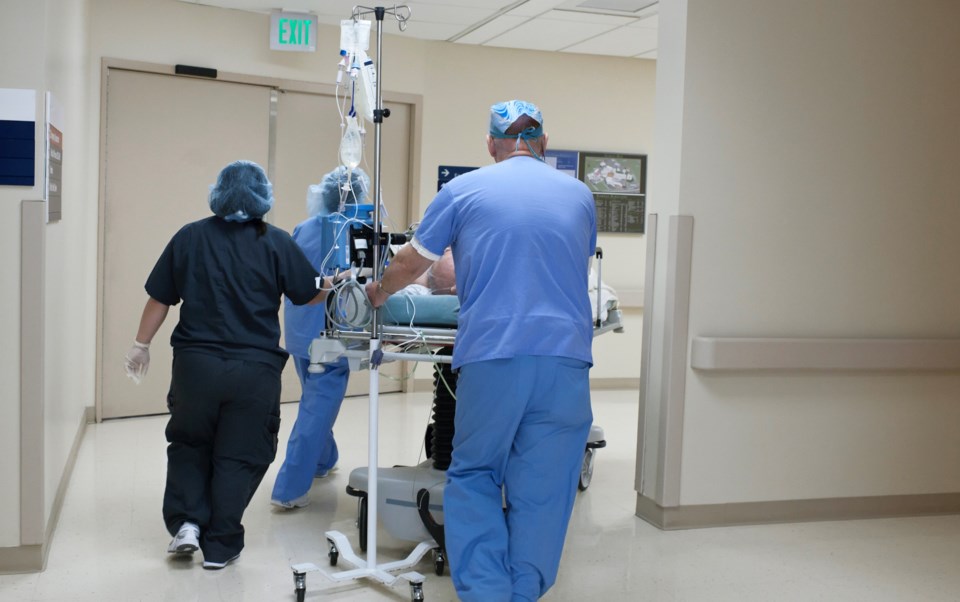The high numbers of COVID-19 patients in intensive care units (ICUs) has precipitated what many feared: a rise in those patients' deaths.
B.C. recorded 11 new COVID-19 deaths in the past 24 hours, which is the highest number for a single day since February 3, when there were 16. The deaths raise B.C.'s pandemic death toll to 1,888.
The government many times announced higher numbers of new deaths following weekends, but those counts were all for multiple days.
The new deaths include:
• two in Fraser Health;
• four in Â鶹´«Ã½Ó³»Coastal Health; and
• five in Interior Health.
A breakdown of the ages of those who died was not immediately provided.
Adding to the fear that more deaths could be on the horizon is the ever-rising number of COVID-19 hospitalizations across the province.
There are now 298 people in B.C. hospitals with COVID-19, which is the highest number since May 25, when there were 301.
Of those hospitalized, there are 135 in ICUs, which is one more than yesterday, but two fewer than the day before yesterday.
Case counts continue to be fairly high, with 768 new infections detected in the past 24 hours, raising the number of those infected since the first case was detected in B.C. in late January, 2020, to 177,954.
More than 95.3%, or 169,653 of those, are deemed by the province to have recovered because they have gone 10 days after first feeling symptoms, and are therefore not thought to be infectious.
The vast majority of the 6,031 people fighting active infections have been told to stay home and self-isolate.
Unvaccinated people have been driving new, and active infections, as well as hospitalizations.
Data released today show that of the 384 hospitalizations in the two weeks ended September 15, there were:
• 310 not vaccinated (80.7%);
• 21 partially vaccinated (5.5%); and
• 53 fully vaccinated (13.8%).
After factoring for age, people not vaccinated are 35.1 times more likely to be hospitalized than those fully vaccinated, according to the province.
The 4,804 cases in the week ended September 15 included:
• 3,288 (68.4%) unvaccinated;
• 358 (7.5%) partially vaccinated; and
• 1,158 (24.1%) fully vaccinated.
Vaccinations in B.C. continue at a reduced pace, compared to a few months ago, because the vast majority of residents have already received their two needed doses. A small group of about 15,000 people, who are considered extremely immunocompromised, are eligible for third doses of vaccine. Invitations for those people to get their third jabs are being sent.
It is unclear if widespread introduction of third doses of vaccine will go into effect in Canada.
In a surprise move in the U.S. earlier today, the country's Food and Drug Administration’s (FDA) advisory committee voted overwhelmingly against considering booster doses of the Pfizer vaccine for all Americans aged 16 or older. U.S. President Joe Biden had said that Americans older than 16 years would be eligible starting next week to get third doses of that vaccine as soon as they had gone eight months from their previous dose.
Instead, that FDA committee unanimously voted in favour of allowing booster doses of that vaccine only for people who are aged 65 and older, and for people who are at a high risk of severe disease.
Drug makers' share prices fell in the regular and after-hours markets, indicating that investors had expected a much wider roll-out of third doses.
Health officials in B.C. provided 16,759 doses of vaccine to British Columbians in the past day, with 9,297 of those being to unvaccinated individuals, and 7,462 going as needed second doses. No data was available for any third doses.
The total number of B.C. residents who have received one dose of vaccine passed the four-millionth-dose threshold, with 4,008,076 individuals now with one dose of vaccine.
More than 91.3%, or 3,652,033 of those are considered fully vaccinated, with two doses.
The B.C. government estimated in July that the , so Glacier Media's calculation is that more than 77.8% of B.C.'s total population has had at least one dose of vaccine, and nearly 71.1% of the province's total population has had two doses.
Government estimates are that 86.5% of B.C.'s eligible population, older than 12 years, has received one dose of vaccine, while 79.8% of that population is fully vaccinated with two doses.
Northern Health continues to be the health regions in B.C. with the highest number of new cases, and active cases on a per-capita basis. Interior Health also has a much higher per-capita number of new and active infections than do health regions in the Lower Mainland and Â鶹´«Ã½Ó³»Island.
Glacier Media crunched the numbers for how many of the 768 cases identified in the past day were in each of the province's health regions. The result for the number of new infections for each 10,000 residents (with total new cases in brackets) was:
• 1.3 in Fraser Health (239);
• 0.7 in Â鶹´«Ã½Ó³»Coastal Health (83);
• 2.5 in Interior Health (183);
• 5.4 in Northern Health (161); and
• 1.2 in Island Health (102).
The result by health region for the 6,031 people fighting active infections for each 10,000 residents (with total new cases in brackets) was:
• 10.3 in Fraser Health (1,846);
• 8.3 in Â鶹´«Ã½Ó³»Coastal Health (1,043);
• 20.2 in Interior Health (1,499);
• 31.1 in Northern Health (933); and
• 1.2 in Island Health (700).
The active case counts include 10 people who normally live outside B.C.
Some good news is that there are no new health-care facility outbreaks. The outbreak at Sunset Lodge in Victoria is newly declared to be over. The province has 20 active outbreaks in seniors' homes and acute-care facilities.



